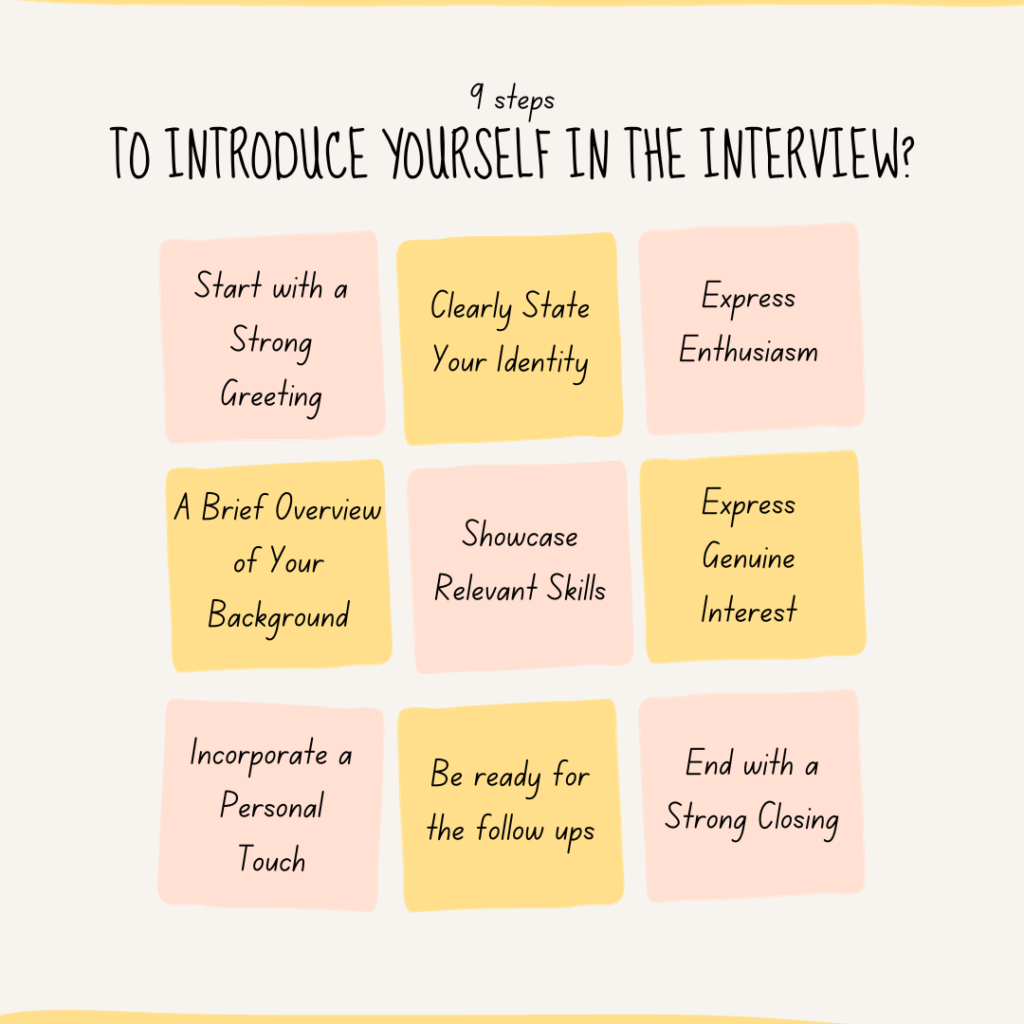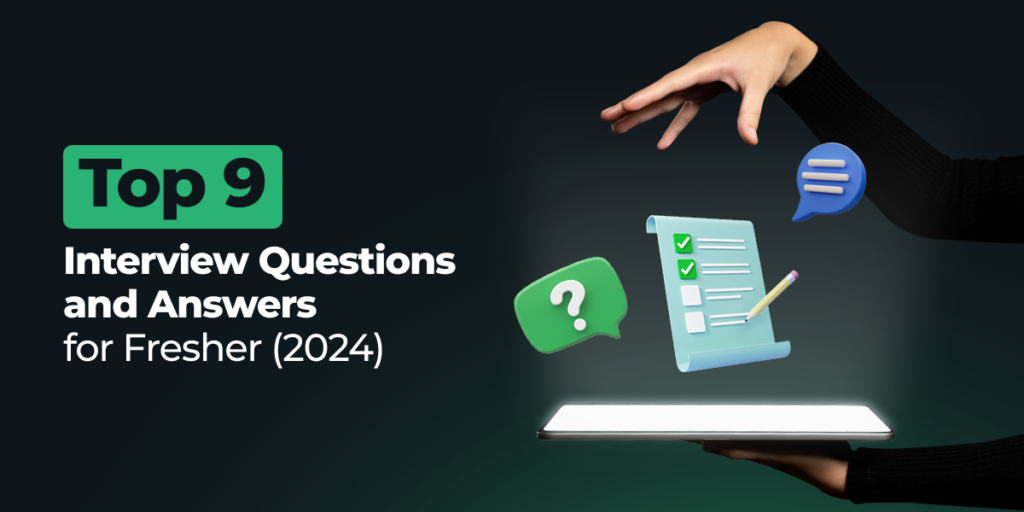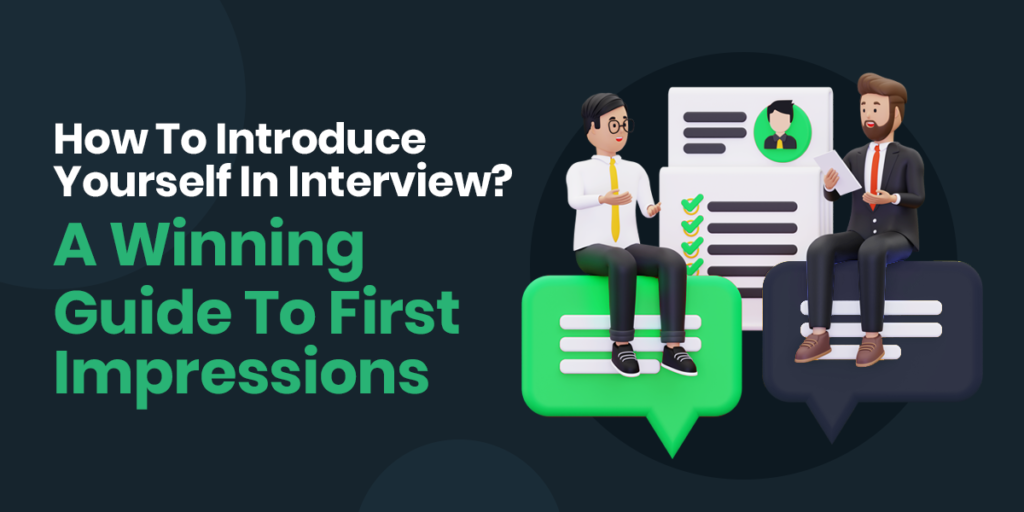Introduction
The first few minutes of an interview can be make or break for a job seeker. How you introduce yourself sets the tone for the entire conversation and can greatly impact the impression you make. It’s crucial to take advantage of this opportunity to showcase your professionalism, confidence, and relevant skills. When it comes to ‘How to Introduce Yourself in Interview,’ a strong first impression is essential. Beyond just stating your name and professional title, there are several strategies you can employ to make a lasting impact on the interviewer. To help you make a strong first impression in any interview, this article will guide you to introducing yourself effectively.
Why Properly Introducing Yourself In An Interview Is Important

Properly introducing yourself at an interview is important for several reasons, as it sets the tone for the entire interview and has a significant effect on the interviewer’s perception of you. Here are some of the main reasons why a well-crafted introduction is essential: ‘How to Introduce Yourself In Interview As A Fresher’.
- First Impressions Matter: The saying “you never get a second chance to make a first impression” holds true in the professional world. Your introduction is the first opportunity to present yourself positively, and a strong start can leave a lasting impact.
- Differentiates You from Other Candidates: In a competitive job market, where multiple candidates may be vying for the same position, a compelling introduction can help you stand out. It allows you to showcase your unique strengths and contributions early in the conversation.
- Reflects Confidence: A confident and composed introduction reflects positively on your overall confidence. It sends the message that you are comfortable talking about yourself and your qualifications, which can contribute to a positive perception.
How To Introduce Yourself In the Interview?

Here’s a simple and effective way to do it:
1. Start with a Strong Greeting: Make it Warm and Professional
Begin your introduction with a polite greeting appropriate for the time of day. A simple “Good morning/afternoon/evening” followed by the proper title and last name. This simple yet effective greeting establishes a positive and respectful atmosphere, laying the foundation for a constructive exchange during the interview.
Before the interview, please make sure to conduct a research about the company, its values, culture, and the role you are applying for. This will help you tailor your introduction to the specific needs of the organization. Additionally, make sure you have a clear understanding of your own qualifications, skills, and experiences that are relevant to the position. When responding to the common question ‘how to answer tell me about yourself in the interview,’ consider incorporating these insights into your introduction on how to answer it effectively in the interview.
2. Clearly State Your Identity: Say Your Full Name with Confidence
After the initial greeting, confidently state your name while considering clarity and articulation. Additionally, it can be beneficial to mention your current professional title or the title you are aspiring to, particularly if it corresponds with the position under discussion. This not only reinforces your professional identity but also communicates alignment with the role, signaling your qualifications and relevance to the prospective position.
3. Express Enthusiasm: Convey Your Excitement for the Opportunity
Express sincere enthusiasm for being present at the interview. A brief acknowledgment of gratitude, such as “Thank you for giving me this opportunity,” coupled with a statement expressing your excitement about the opportunity, demonstrates your eagerness and positive attitude.
This combination of gratitude and enthusiasm not only showcases your positive attitude but also communicates your genuine interest in the position. Demonstrating eagerness to be part of the team fosters a favorable impression, illustrating your commitment to making a valuable contribution within the prospective role.
4. Provide a Brief Overview of Your Background
Provide a concise overview of your professional background and relevant experiences. Highlight your achievements, skills, and qualifications that make you a strong fit for the position.
- Professional Background: Highlight Key Experiences and Achievements:- Provide a concise overview of your professional background, emphasizing relevant experiences and accomplishments. Highlight your current or most recent position, focusing on key responsibilities and achievements that showcase your skills and expertise. This is your chance to present yourself as a valuable candidate from the outset.
- Educational Background: Summarize Your Academic Achievements:- Follow up your professional background with a brief overview of your educational journey. Mention your degrees and the institutions where you earned them. Keep it succinct, focusing on the qualifications that are most relevant to the position you’re interviewing for. For freshers it is strongly recommended to connect your educational background with the position to show your worthiness for the role.
5. Showcase Relevant Skills: Align Your Skills with the Job Requirements
Highlight key skills that align with the requirements of the position. Choose wisely, focusing on strengths that make you a great fit. This part of your introduction is like a sneak peek into how valuable you can be in this role. By pointing out key skills that align with the job’s needs, you show that you have exactly what it takes. This smart approach not only grabs the employer’s attention but also shows how you can contribute a lot to the position and gives more weight to your application.
6. Express Genuine Interest in the Company: Express Genuine Interest
Express your genuine enthusiasm for the organization and the position by articulating particular reasons for your enthusiasm about the opportunity. This might include the company’s remarkable reputation, core principles that resonate with you, exciting growth prospects, or notable recent accomplishments or initiatives that have attracted your interest.
This approach not only underscores your genuine interest in the organization but also positions you as a candidate who aligns with the company’s values and vision, fostering a stronger rapport during the interview.
7. Incorporate a Personal Touch
While it’s important to maintain professionalism, don’t be afraid to add a personal touch to your introduction. This might include mentioning any relevant hobbies, volunteer work, or personal qualities that align with the values of the company or position. This showcases your personality and helps the interviewer remember you as a well-rounded candidate.
8. Be Attentive and Adapt: Be ready for the follow ups
Pay close attention to the interviewer’s reactions and cues during your introduction. If they seem interested or ask follow-up questions, provide more detail. Alternatively, if they seem disengaged or the conversation moves in a different direction, be prepared to adapt and shift your focus accordingly. Flexibility and attentiveness are key attributes that interviewers look for in candidates.
9. End with a Strong Closing: Conclude with positive vibe
To conclude your introduction, thank the interviewer for their time and express your enthusiasm for the opportunity to further discuss your qualifications. Let them know that you are looking forward to exploring how you can contribute to the success of the company. This leaves a lasting positive impression and paves the way for a successful interview.
Sample
Here is the how to introduce yourself in interview sample answer:
| Thank you for having me. I’m [Your Full Name], and I’m very excited to be here today and learn more about the [position/company]. I am having [X years] of experience in [your industry or relevant field], with my most recent role as [Your Current or Most Recent Position] at [Your Current or Previous Company]. In that role, I [briefly mention a key accomplishment or responsibility that is relevant to the new position]. On the educational front, I hold a [Your Degree] in [Your Major] from [University Name]. One of the aspects that drew me to apply for this position at [Company Name] is [specific aspect of the company that you admire or find appealing, e.g., its commitment to innovation, its diverse and collaborative culture]. I’ve been following the company’s [mention recent achievement, project, or news] with great interest, and I am eager about the possibility of contributing to such an exciting and forward-thinking team. In terms of skills, I bring expertise in [mention a couple of key skills relevant to the job]. My experience has honed my ability to [mention a strength or skill that sets you apart]. I am particularly drawn to this role because [mention a specific reason, e.g., alignment with your skills and career goals]. I’m confident that my background in [industry/field] and my passion for [specific aspect of the job or industry] make me a strong fit for this position. I look forward to discussing in more detail how my skills and experiences align with the needs of the [position] and how I can contribute to [company’s] success. Thank you again for the opportunity, and I’m excited to dive into our conversation. |
Conclusion
Mastering the art of introducing yourself in an interview is a key skill that can have a big impact on the hiring process’s outcome. You may make a positive and lasting first impression by combining professionalism, excitement, and a planned presentation of your experience and skills. So, the next time you’re in the hot seat, remember these winning strategies to turn your introduction into a stepping stone to interview success, ‘How to Introduce Yourself in Interview.’
FAQs
Ans: While the structure remains similar, tailor your introduction for each interview by emphasizing aspects of your background and skills that align with the specific position and company you’re interviewing with.
Ans: It’s beneficial to have a well-practiced introduction, but aim for a natural delivery. Memorization can help ensure you cover key points, but be flexible and adapt based on the dynamics of the interview.
Ans: Begin with a polite greeting and express your gratitude for the opportunity. Follow this with your full name and a brief statement conveying your enthusiasm for the interview. Highlight your educational background, emphasizing your major, degree, and the institution you attended. Briefly mention any relevant coursework or projects that showcase your skills.
Ans: Begin confidently with a warm greeting. Highlight your experience and major accomplishments succinctly. Emphasize how your expertise aligns with the position, expressing enthusiasm for the opportunity.
Read More Related Articles
- Data Science vs Data Analytics: Top Key Differences for Success

- How To Become A Data Scientist In India?: Achieve Your Data Scientist Dreams

- What are Callback Function in JavaScript?: A Guide to Effective Implementation

- Top 9 Interview Questions and Answers for Freshers Success

- What Is Python and Its Dynamic Uses?


